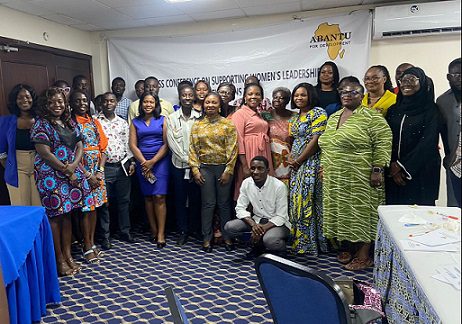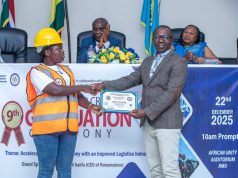ABANTU for Development, with support from the STAR Ghana Foundation and funding from the Foreign, Commonwealth, and Development Office (FCDO), launched a critical initiative aimed at increasing women’s participation in the upcoming 2024 General Elections.
The project, titled “Strengthening Advocacy for a Gender-Responsive and Inclusive Governance in Elections 2024 and Beyond,” focuses on amplifying the voices of women, including young women and women with disabilities, in Ghana’s political and governance spaces.
Despite significant democratic progress since 1992, women hold only 40 of the 275 seats in Parliament, representing just 14.55% of the total. With the elections just weeks away, ABANTU is urgently calling for action to address this stark gender imbalance.
According to ABANTU and its partners, this is not just a numbers issue. The absence of women in key decision-making roles threatens the future of inclusive democracy. We can no longer afford to overlook the role of women in governance. The time for change is now.
Moreover, the launch of this initiative coincides with the recent passage of the Affirmative Action (Gender Equity) Act, 2024 (Act 1121), which mandates a minimum of 30% women in decision-making positions by 2026, increasing this figure to 50% by 2030.
ABANTU sees this as a unique opportunity to push for real change and has been diligently encouraging voters, political parties, and civil society organizations to fully embrace gender equity in the lead-up to the December elections.
Mary Akromah, Senior Programmes Officer at ABANTU for Development, made this known during a press conference in Accra and emphasized the critical need to address the gender gap in Ghana’s political landscape.
“Women make up more than half of Ghana’s population, yet their voices are rarely heard in decision-making spaces, from district assemblies to Parliament,” Akromah stated.
“This project is not just about numbers; it’s about fostering leadership that truly reflects our society. The underrepresentation of women in public life is a major gap that must be addressed as we approach the 2024 elections,” she added.
The initiative aims to ensure women’s leadership is not just an afterthought, but a driving force in Ghana’s political landscape. ABANTU’s call to action is clear: empowering women in leadership roles is vital for inclusive governance and sustainable development.
“The conversations we are having today are a step toward building the collective momentum needed to support women candidates in the upcoming elections,” said Akromah. “By empowering women, we are harnessing the full potential of our society, which will lead to more inclusive and equitable outcomes for all.”
As Ghana heads into the critical 2024 elections, ABANTU for Development is rallying stakeholders across all sectors to join in the effort to give women the leadership roles they deserve. “This isn’t just about increasing the number of women in politics; it’s about creating a governance system that works for everyone,” Akromah added, urging all to take action for a more gender-equal future.
The Coordinator of the AAL Coalition, Becky Enyonam Ahadzi, also called for greater support for women candidates in the 2024 presidential and parliamentary elections.
Ahadzi emphasized the significance of the passage of the Affirmative Action (Gender Equity) Act, 2024 (Act 1121), which mandates that women hold at least 30% of decision-making positions by 2026, with this figure rising to 50% by 2030.
She stressed the Act’s potential to drive gender equality in governance and urged both the public and political parties to support its full implementation.
Women’s Representation in Decision-Making
Ahadzi pointed out that women form over 50% of Ghana’s population, yet their representation in Parliament remains low, currently at just 14.55%, with only 40 women out of 276 parliamentary seats.
She stated that the absence of women in key decision-making roles has led to laws and policies that are not gender-responsive, which negatively impacts the population as a whole.
She added, “Unless women have a voice at the table, issues concerning a significant portion of our population will continue to be overlooked. Sustainable development is only possible when there is inclusivity in decision-making spaces.”
The Impact of the Affirmative Action Act on 2024 Elections
The Affirmative Action Act’s passage is seen as a major step toward gender equality in Ghana’s political landscape, but Ahadzi expressed concern that the law was passed after the primaries of major political parties, limiting the number of women candidates in the 2024 elections.
She called on the public to vote for the women who are standing for office, noting that around 100 women candidates are running for parliamentary seats, along with several female presidential candidates.
Political Parties’ Role in Achieving Gender Equity
She also highlighted the responsibilities of political parties under Section 20 of the Affirmative Action Act, which mandates them to implement measures that support gender equity.
This includes providing resources, mentoring, and leadership training for female candidates. Political parties are also required to factor in gender quotas when sponsoring candidates for elections.
The Coalition is collaborating with the Constitutional Review Committee to propose further provisions for gender inclusivity in the electoral process, strengthening the impact of the Affirmative Action Act.
Legal Protections for Women in Politics
The Affirmative Action Act also provides legal protections for women in politics. Section 28 of the Act makes it an offence to discriminate against or harass female candidates based on gender.
Ahadzi stressed that the law’s provisions ensure women can participate in politics and public life without fear of intimidation or obstruction.
Beyond the Elections: Appointments to Public Office
In addition to its focus on elections, the Affirmative Action Act also mandates the government to ensure gender balance in public office appointments.
Section 14 of the Act requires the President to consider gender equality when making appointments to key positions, including ministerial roles, the Council of State, and other governing bodies.
Ahadzi encouraged women to leverage the provisions of the law to ensure they are appointed to important positions, regardless of the outcome of the elections.
A Call to Action
The Coordinator of the AAL Coalition called on all Ghanaians to support the women candidates standing in the 2024 elections and to hold political parties accountable for fulfilling their obligations under the Affirmative Action Act. She emphasized that achieving gender equality in governance is essential for Ghana’s sustainable development.
“Let us resolve to ‘Vote for WOMEN’ in the upcoming December 2024 elections,” Ahadzi urged. “When women have a seat at the table, we can create more gender-responsive policies and laws that better serve the needs of the entire population.”
She also encouraged continued advocacy for the full implementation of the Affirmative Action Law, urging Ghanaians to join the campaign with the hashtag #ImplementTheAALawNow.
Source: Isaac Kofi Dzokpo/newsghana.com.gh

















